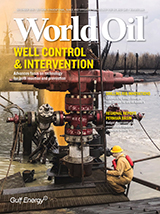Issue: December 2019
Special Focus
Engineers examine the importance of advanced simulation to enhance well barrier design and maximize well control.
A team of dedicated field engineers utilized specialized turbine technology to dredge a lake bed, to uncover a sufficient length of competent production casing, to accommodate a modified surface capping stack, and secure the well.
Features
Land rigs have evolved over the years, incorporating increasingly advanced technology with greater levels of digitization and automation. The evolution has been driven by the increased power/torque required for more complex borehole construction and extended-reach wells.
Budget constraints elicit considerable slowdown in Permian basin
The rig is a little taller than the driller, and the bit fits in the palm of his hand. Designed, built and operated by a team of university students, the miniature drilling system is making hole for SPE’s international Drillbotics competition. Their objective is to autonomously drill a directional well to plan, as quickly as possible, while maintaining borehole quality, and integrity of the rig and drillstring.
As 2019 began, our editorial advisors, like many of us in the industry, had hopes for an improved market during the course of the year. Unfortunately, that has not come to pass, and 2019 will be remembered as the year that the U.S. shale revolution sputtered and leveled out. The confinement of the oil price in the low-to-high $50s for most of second-half 2019, for WTI crude, is remarkable. This also will be remembered as the year that OPEC+ frequently had to defer to the U.S., as the new swing producer, to help balance supply with demand.
And while the “quieting” of U.S. shale should continue through most of 2020, there are some brighter spots in the global E&P market. There is ample evidence that offshore activity is slowly, but surely, improving, particularly outside North America. And conventional oil and gas, outside the U.S. and Canada, are showing some life, due in part to increased spending and activity by NOCs, particularly in the Middle East.
Meanwhile, the six most senior members of World Oil’s Editorial Advisory Board again provide their thoughts on this year’s market and what might be in store for 2020. In the process, they examine a wide range of industry trends, including the pillars of success; the unique, continuous transition of the UKCS; hydrogen’s role in the energy mix; getting the message right to the public; going back to the top of the slide; and entrepreneurship helping to foster good energy policy.
As shale drilling and completion operations have advanced, so, too, have wellhead control technologies. The RSH wellhead system is bringing greater well control, safety and cost-efficiency to shale plays in the U.S. and beyond.
A "cowboy" bucks headwinds, beefs up gas holdings
Integrating with next-generation electric ROVs, the newly developed VMAX simulation software has a variety of ROV scenarios to test pilots’ skills. Subsea engineers can use it for modeling and verification of procedures involving intervention tasks.
Columns
Into the weeds
Au revoir Paris
An historical moment quietly occurs
Reducing exploration to save money or “climate” is stupid
Get smart
Embrace the shift: How operators, service
companies and manufacturers must adapt
Why can't we learn from past mistakes?
News and Resources



